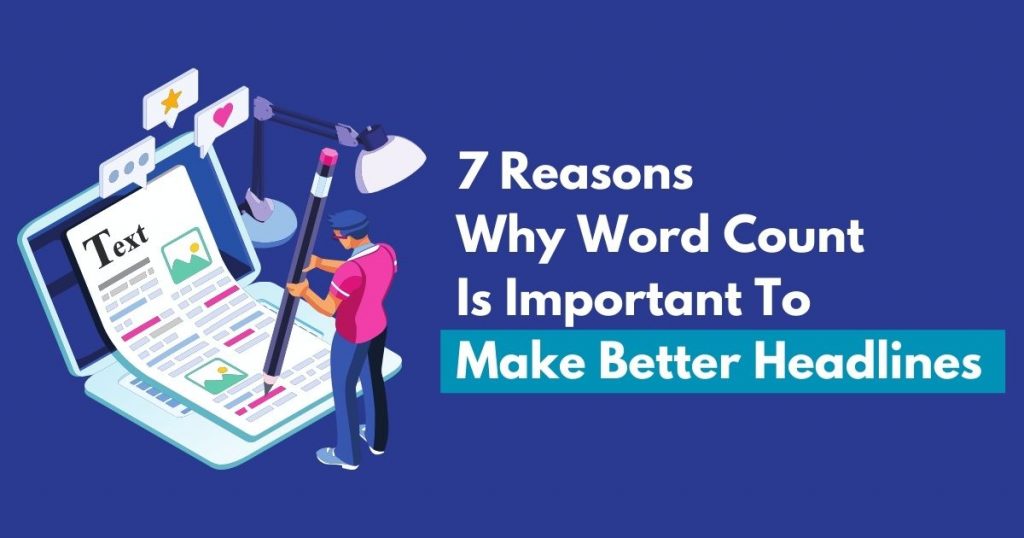
7 Reasons Why Word Count Is Important to Make Better Headlines
Table of Contents
ToggleSharing is caring!
Reading Time: 4 minutes
While crafting an article, the headline is one of the most crucial things you need to consider.
The headline is the first thing visitors see; accordingly, it is important for content writing and marketing.
That's why writing an eye-grabbing headline is the only key to attracting your target audience's attention. But, most importantly, you should focus on producing a top-quality SEO title.
What makes an impeccable SEO headline?
This article covers multiple components needed to write a well-knit SEO title.
Check out these reasons why the title of your post can turn people into leads or even break them.
Witty words attract more people
You have only five seconds in hand to attract visitors to read your content. People will skip reading your article if it does not have a catchy title.
No matter how witty, engaging, or informative your content is, it will be ignored. Thus, you should focus on your title.
So, spend plenty of time coming up with a well-driven title for your post. Moreover, it is also vital to capitalize your headline correctly, regardless of the style you use.
A headline with perfect word count makes it clickable
A strong course of action or a word of caution can land thousands of people on your page. Thus, you should craft a unique and attractive title for your article.
Most importantly, renowned marketers and seasoned content writers know that not everyone enjoys reading multi-page articles.
That's why they use an online word counter to limit the number of words in their content. This helps them to keep track of their post's word count.
They know earning a high ranking on search engines is the finest way to explain their online presence. As a result, the word counter assists them in counting characters, words, sentences, and even pages.
Longer content, according to many SEO experts, is better. Many pieces of research have been done that show a clear link between word count and rank.
An article's word count is another important factor in the digital era. This is why the word count of content is a ranking factor for Google.
Focusing on word count increases visibility
A strong title can increase your search engine ranking and traffic. Accordingly, you should consider this significant factor.
Knowing how to use exact keywords will help search engines to rank your article. Figure out all the searching terms people use to find the information they are interested in.
Use the tools like SEMrush or Ubersuggest for determining how frequently your keywords are searched and how competitive they are.
Pique your readers' interest
Have you ever come across a headline that made you feel excited to read the entire article?
And once read it, you could not stop yourself from telling everyone you know about it.
Likewise, you should follow this type of approach in your content. Plus, add the factual information in your titles.
Readers will bounce back if you attract them with the well-knit title but fail to deliver quality content.
Entertain readers with quality words
People are not only looking for information on the internet; they also want to be entertained, intrigued, or amused.
Incorporate thought-provoking elements in your titles.
Headlines should be visible
Consider your own search patterns. You type in a keyword and are surrounded by hundreds of search results.
You scan the titles for promising-looking content before you even glance at the meta-descriptions. If the title of an article or post does not pique your interest, you simply move on and hunt for a title that does.
Help you engage your target audience
You should think about who would be interested in your work.
The majority of people are looking for information that is relevant to them. Remember, they are not interested in you, but they want to find something valuable and informative.
In a nutshell, titles are crucial to the success of your posts.
Six valuable tips for writing powerful headlines in 2022
If your headline fails to pique the reader's interest, you will lose your audience.
Briefly explain your content
The ideal headline does what it says. The purpose of headlines is to tell the viewers what to expect when they click through.
People will arrive at your content and read what they expected if the headline is crafted impressively. On the contrary, a misleading title negatively impacts your SERPs.
Use straightforward language
A readable title gives readers a clear idea of what they may expect to read.
Young copywriters and marketers frequently make the mistake of creating headlines in the manner they learned in university – which is a blunder.
Incorporate a strong emotional element
Include an emotional response in your title. It can be useful to consider what emotion you want to elicit in your average user – whether it's fear, surprise, or something else.
Follow the below-mentioned examples:
- Proven
- Techniques
- Amazing
- Surprising
- Valuable
- Recommendations
- Suggestions
- Fundamental
- Untold
Include SEO keywords
Create an intriguing headline that people will want to read and click on first. In addition, incorporate keywords in it.
Make sure you have a comprehensive keyword list that describes your website and goods.
Make use of numbers
Numbers are useful because they are extremely receptive in our brains, and individuals enjoy learning in groups.
Add numbers in your copy because they make posts easier to browse and help readers focus on the most interesting elements.
Be unique
Uniqueness and originality are the keys to driving conversions and boosting sales. Therefore, unique and creative articles on the web rank better than others.
Most significantly, stay away from headlines that are exact replicas of those already on the internet.
Most Popular Posts:
Sharing is caring!
PLEASE COMMENT BELOW